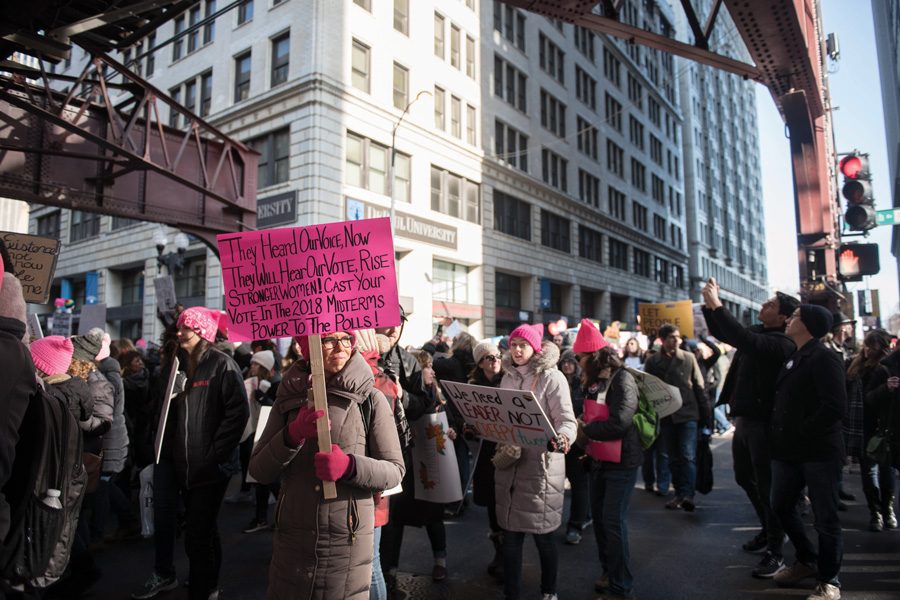Students name protecting reproductive rights as motivation to vote
Daily file photo by Katie Pach
A woman participating in the Chicago Women’s March last January calls for supporters of women’s rights to vote in the November midterm.
October 22, 2018
Ahead of the November midterm elections, Daily reporters are speaking to students about issues they’ll take to the polls. In this article, students take on the vulnerability of reproduction rights.
In the landmark Roe v. Wade decision 45 years ago, the United States Supreme Court upheld a woman’s constitutional right to abortion, but reproductive rights remain a polarizing topic this election season.
Planned Parenthood and NARAL Pro-Choice America as well as President Donald Trump and the Republican Party have centered reproductive rights at the forefront of the November midterms. Not one GOP nominee in a competitive race has publicly backed abortion rights this year.
According to the most recent poll released by GenForward, a research center at the University of Chicago, 13 percent of young adults said that women’s rights, the nomination of Justice Brett Kavanaugh to the Supreme Court or the court’s potential decision to overturn Roe v. Wade were the most important issues motivating their decision to vote in the elections.
A vocal subset of that 13 percent is college students, including those at Northwestern. Weinberg freshman Xanh Quang said he is heading into the midterms prepared to support pro-choice candidates, and he encourages young voters to follow him.
“It is essential that (Northwestern students) go out and vote,” Quang said. “Kavanaugh is a man, and all major positions in the U.S. have been held by men who have rights to control their entire body, so why shouldn’t the other half of the human race also have the ability to control every single part of their body?”
Eden Hirschfield, a SESP freshman and member of Northwestern’s new Planned Parenthood chapter, said she plans on voting in the Illinois midterms with funding for healthcare clinics in mind.
While Hirschfield has supported Planned Parenthood for years, she said joining the chapter on campus has helped her stay informed, especially in the wake of Trump’s proposal to cut all Title X funding to clinics that perform abortions.
“People forget that Planned Parenthood provides so much more to woman than abortions,” Hirschfield said. “Some of our country’s most vulnerable people rely on Planned Parenthood for cancer screenings and treatment for STDs, and last time I checked men need cancer screenings and STD treatment too.”
According to the GenForward survey, students are also concerned about whether the appointment of Kavanaugh will have an impact on Roe v. Wade. Tonja Jacobi, a law professor at Pritzker who specializes in judicial politics, explained that while she believes the legislation won’t be overturned, Kavanaugh may bring more restrictions on a woman’s right to abortion.
“Essentially (the Supreme Court) could make Roe v. Wade protect nothing by using precedent that says… all of these burdens that the states are putting on the right to choose are reasonable,” Jacobi said. “We’ve seen the courts do that with prior restrictions, and that’s going to be even more extreme with Kavanaugh.”
However, Hirschfield said she has faith that no matter the consequences of the midterm elections, the movement for access to birth control, equitable healthcare funding and access to safe and legal abortion will prevail.
“If (reproductive rights) are restricted, the pro-choice community will work endlessly to have them reinstated,” Hirschfield said. “They’re just too important to ever stop fighting for.”
Email: daisyconant2022@u.northwestern.edu
Twitter: @daisy_conant



